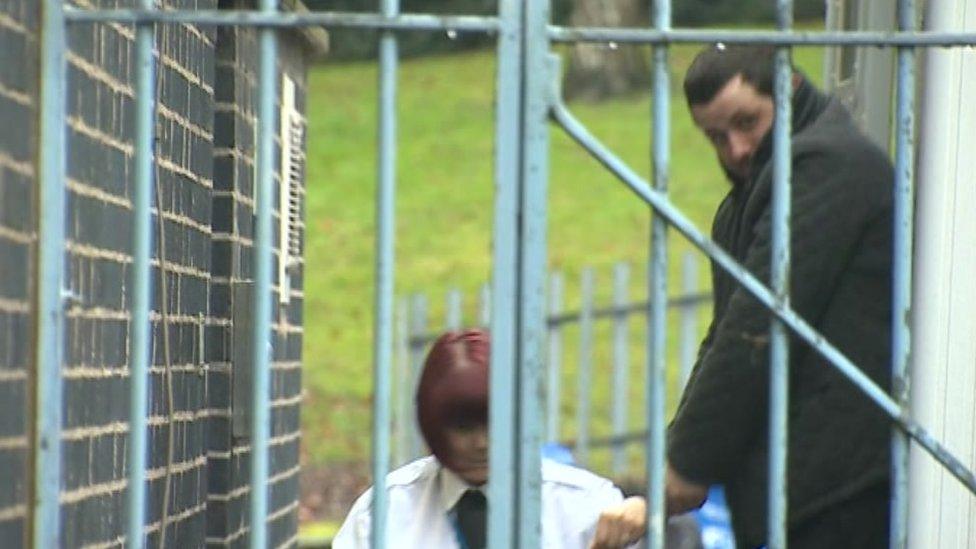Laura Stuart: Murdered by controlling ex Jason Cooper
- Published

Laura Stuart was murdered her "jealous" and "controlling" ex-partner
Laura Stuart's ex "hunted her down" in the street. He lay in wait. When he had her where he wanted her, he launched a frenzied knife attack.
She was stabbed in the head, back and chest and then subjected to a barrage of kicks to her body as she lay bleeding and helpless.
As part of his horrific attack, Jason Cooper, 28, also stabbed Laura's friend David Roberts who had tried to defend her.
This was Cooper carrying out his "clear plan" to kill the woman who had dared leave him after she had endured months of jealous, controlling and humiliating behaviour he inflicted on her.
Laura was a 33-year-old mother of two. She worked at a home for people with learning disabilities and autism. She was popular and well liked.
She had been in a volatile relationship with Cooper for about two years but after his behaviour became increasingly abusive and threatening, she finally left him.
But it was not to be the escape she had hoped for as Cooper's anger and resentment spiralled culminating in the brutal assault he carried out on her as she walked home from a night out in Denbigh town centre in north Wales in August 2017 and her death two days later from the injuries he inflicted on her.
Although it came as a huge shock to her colleagues, friends and family, Laura's death was the culmination of what the prosecution called a "clear plan" by Cooper.
Read more about the trial:
In the days leading up to her death, Cooper had sent her threatening messages.
One read: "Did you honestly think you could... walk away happy?"
"U have pushed me as far as I will go now. My advice to u Laura is run," said another.
He also targeted men he believed were involved with Laura, telling one: "I'm ready to kill" and another: "She is a cancer and I will erase her.... it will happen".
The couple had been in a relationship for around two years and had shared a rented property in the town centre.
It was not a happy pairing - according to Laura's friends and family, the couple argued regularly and Cooper was controlling and occasionally violent; he did not like his girlfriend going out or being in the company of other men.
Her mother Elizabeth Griffiths told the jury that Cooper would put her daughter's thumb on her phone while she was asleep to unlock it, so that he could check her messages.
Possessive behaviour
There had been allegations that he assaulted Laura outside the town's RAF club, injuring her thigh and shoulder, she said. Another time - about six weeks before she died - he threw a plate of dinner at her, causing a cut which bled.
Laura's friend Angharad Carter said Cooper called his partner names and always wanted to know her whereabouts and that Laura would keep receipts to show him what she had bought and when.
The court heard that the police were called by both parties during the course of the relationship but no formal complaint was ever made.
By early 2017, Laura moved out of their home, blaming her partner's possessive and jealous behaviour.
From time to time they attempted to resume their relationship but the arguments continued.
Cooper's anger escalated; he became convinced Laura was seeing other men.
He bombarded her with vicious messages via text and social media, which, according to her mother, got worse when he realised she was not going back to him.
"He didn't like her having friends, never mind relationships with men," Mrs Griffiths said.

Jason Cooper (r) claimed to have been in a "deep depression" when he attacked Laura Stuart
On one occasion, he confronted her in a pub, calling her a "whore" and a "liar".
When the landlord asked him to leave, he took some change from his pocket and threw it at her feet, saying: "That's all you're worth".
On 9 August Laura went to the police to complain about Cooper's behaviour but left without making a formal statement.
Two days later, she lay helpless in the street, bleeding heavily after being stabbed in the head, chest and back, as Cooper kicked her repeatedly in the face and stomach.
One witness told the trial at Mold Crown Court it was like "someone taking a penalty in a Premiership game".
All the bones in her nose were broken, her cheekbones were fractured and according to a pathologist, she had suffered "catastrophic internal blood loss".
Cardiac arrest and irreversible brain damage followed and Laura died in hospital on 13 August.
Cooper was convicted of her murder.
Kitchen knife
David Roberts, who attempted to defend her, had a partially collapsed lung after being stabbed in the elbow, shoulder and ear.
Cooper was convicted of wounding him with intent to cause grievous bodily harm.
The Independent Police Complaints Commission launched an investigation into the contact North Wales Police had with Laura before her death.
Prosecutor David Elias QC said Cooper had been "lying in wait" for his ex-partner as she left the Golden Lion pub in Denbigh town centre.
He had been drinking all day in the town's RAF club and sending messages to her phone, threatening both her and another man.
One read: "Is he willing to die?" and another: "R u?"
Cooper went home, got a kitchen knife and returned to the town centre, in search of Laura.
Mr Elias said: "As he had painstakingly threatened in many messages to Laura Stuart and others, he hunted her down in the street and killed her."
After the attack, witnesses saw Cooper smiling.

Laura Stuart and David Roberts were attacked as they walked home from a night out in Denbigh town centre
"I said I was going to do it and I did," he said.
He sent a phone message to a friend saying: "Sorry mate couldn't handle it I murdered Laura" and later told police: "It's not one of those psychopathic things where you just go nuts for no reason.
"She thought she was going to live her life and leave me in the lurch and she'd be as happy as Larry... not on my watch."
But during his trial, Cooper denied murdering Laura, claiming he had not intended to kill her.
A psychiatrist said he had been suffering from an "abnormality of mental functioning" caused by alcohol dependence and his defence barrister asked the jury to return a verdict of manslaughter on the grounds of diminished responsibility.
But the jury disagreed. Cooper was not, as his defence insisted, "a troubled soul in turmoil", but a murderer.
After the verdict, Welsh Women's Aid said the case was a "stark reminder of the devastating impact of domestic abuse".
"Coercive, controlling behaviour is one of the most dangerous forms of abuse and can continue to be experienced by survivors after they have left a relationship," a spokeswoman said.
"The Femicide Census Report 2016 found that women leaving an abusive relationship are at significantly heightened risk of being murdered and in England and Wales, 76% of women killed by their partner or ex-partner are killed within the first year following separation.
"We would like to offer our condolences to the family and friends of Laura Stuart, our thought are with them at this time,"
Laura's colleagues at Highfield Park, Llandrynog were devastated at her death.
"It was very, very sad to lose her in such tragic circumstances," said Kim Moore, managing director of MHC Social Care, which runs the home.
"She was a good worker and very popular. It hit everybody very hard, just walking around the place you could see how upset everybody was.
"You never expect something like this to happen to someone you know."
Her manager Colin Jones added: "Laura had said that her job was a big part of her life and that she enjoyed the support she could provide to the individuals that required her help.
"She was well liked by both the residents and staff team.
"All Laura's colleagues were shocked at the event and she is a big loss to the staff team."
- Published15 March 2018

- Published13 March 2018

- Published12 March 2018

- Published9 March 2018

- Published8 March 2018

- Published7 March 2018

- Published5 March 2018

- Published16 August 2017
